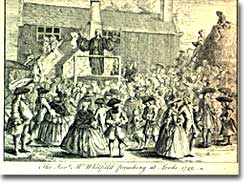
I'd like to write a post about preaching, compiling some of the experiences, books, and revelations that have helped me over the last decade or so. I first started preaching and teaching when I was a student leader for our church's campus ministry at the University of Washington, and was really terrible at it. My friends in the small group would tease me during Bible study by audibly counting the number of times I said "you know" as a pausing phrase. Once, I believe they counted up to over a hundred. :-)
My mentor, Dwayne, would also interject while I was teaching a lesson and ask things like, "So, what does this mean for me?" He was trying to get me back on track when my thoughts went backpacking in the mountains, or I wasn't paying attention to the perplexed or bored expressions on people's faces.
I was so terrible at preaching and teaching that the memory of this time makes me realize how patient God is in readying us for His work. Maybe others are ready to launch into ministry soon after their conversion, but for people like me, God needs to prime the pump early and for a long time before He starts getting good results. (I'm being somewhat facetious, but mainly want to remind myself of how we need to be patient with ourselves and with others.)
I started making good progress in my preaching ability when, after graduation, I moved to Washington, D.C., to help plant a church. At first, I was scheduled to preach twice a month, and then later three times a month. This was in addition to leadership meetings, discipleship meetings, and small group Bible studies. Because I knew that good preaching was a key to the growth of our Sunday service, I looked for ways to improve my preaching. This included rhetorical skills (thinking of ways to convince the listener) and delivery, but also the spiritual side of preaching, which many non-preachers don't really understand. You see, Paul says that his preaching was not just with fine words and human wisdom, but it came with fear and trembling on his part, and with a demonstration of the power of God. This last element is the work of the Holy Spirit either by signs and wonders that attest to the divine inspiration of the message, or by the conviction in the hearts of the hearers.
One of the biggest helps to me was Charles Spurgeon's Lectures to My Students, which is a series of talks that he gave to seminary students that prepare them for ministry. Charles Spurgeon, of course, is known as the "Prince of Preachers," and he writes in his lectures about the selection, content, format, and delivery of a message in addition to the spiritual preparation necessary for an effective preacher. Another influence during this time was The Spiritual Man by Watchman Nee. He emphasized the necessity of doing everything through the power of the Holy Spirit, and taught me to always fear using "soulish" power that looks good to unspiritual eyes, but does not result in lasting spiritual fruit.
I kept up this regimen of preaching and teaching several times each week for nearly five years. This alone wouldn't necessarily have guaranteed any progress on my part, but because I can happily say that I sincerely was concerned for my hearers and wanted to improve, that I was able to make this opportunity fruitful by God's grace.
Since moving back to Seattle and preaching in my pastor's stead whenever he is out of town, I've learned a bit more. I have much more time in between Sunday sermons to think about things, a time that I'm thankful for and believe helps me to come up with more messages that have been "marinated" in thought longer than if I preached more often. I've made it most of the way through Dr. Martin Lloyd Jones' Preaching and Preachers. Like Spurgeon's Lectures, that book distills a lifetime of practical preaching advice. I also learned a lot from Arnold Dallimore's biography of George Whitefield. Whitefield's passion and sincerity was such that he moved Benjamin Franklin to empty his pockets to give to an orphanage and gathered crowds of upwards of 20,000 who would listen without the aid of a speaker system.
However, the most important lesson I've learned so far is that I have so much room left for improvement. My pastor in Seattle has been a tremendous inspiration. When he founded the church 20 years ago, he had to preach in Thai because his English wasn't fluent. But, today, because of his perserverance and dedication to excellence, he delivers very powerful messages in both languages as needed. My pastor also actively seeks more of God's power in his ministry. In many places in the Bible, God promises that those who seek will be rewarded.
The key powerful sermons, I believe, is spiritual authority that comes from God and flows through the preacher, not unlike the authority that the people who heard Jesus marveled at. Yes, there are things we can do to convey our message clearly, be relevant, and keep people's interest. We can also avoid things that annoy, distract, or otherwise interfere with the message. But the key thing, I believe, is spiritual power. I can see the progress that my pastor and others have made in this area and believe that God can use me in a similar way if I allow Him. My prayer is that God will use me as His mouthpiece.
1 comment:
Post a Comment